North Country Girl: Chapter 12 — Country Club Days
For more about Gay Haubner’s life in the North Country, read the other chapters in her serialized memoir. The Post will publish a new segment each week.
My sister Lani and I arrived home to the big news that my dad had switched country clubs. For years he had played golf at Ridgeway Country Club, a mysterious place with a ramshackle clubhouse that I had only glimpsed from the outside when my mom dropped off my dad and his club. Ridgeway members golfed, drank, smoked, and played cards; there were no Ladies’ Days or children’s programs.
Now my dad was a member at Northland Country Club, about as waspy a place as could be in Duluth. No Jews of course, and the inclination would probably have been to exclude Catholics as well, except that Duluth had a deep base of Norwegians who were local business and government bigwigs, as well as supporters of the Church.
Northland’s clubhouse was a gleaming white pseudo-mansion that would not have looked out of place on an antebellum plantation, complete with porte-cochere in the front and a two-story columned patio on the side. There was even a guardhouse at the turn off of Superior Street where you had to stop to have your name checked against the membership roll before proceeding up the long driveway. At the top, nestled beside the clubhouse, was a (semi-) heated pool. After being frog marched into the frigid water of Hanging Horn Lake for swimming lessons at camp, Lani and I took the Northland pool as if it were the Caribbean. The only other pool I had been to in Duluth was the indoor one at Woodland Junior High, where I was forced to take swimming lessons year after year, never passing into a higher category than Minnow. It was impossible to learn to swim in that over-chlorinated, dimly lit Woodland pool. It had a ledge all around it made of concrete mixed with pumice and bits of sandpaper that would take the skin off your legs and arms, and was surrounded by tiles so slippery that anything faster than a trudge resulted in immediate expulsion from the swimming class. And since the pool was inside the school, it was thought not necessary to heat it.
Thrilled with the chance to swim in water that was over 70 degrees, Lani and I spent the rest of the summer begging, “Can we go to the pool? Can we go to the pool?” from the time we woke up. When we got to Northland, Lani and I (always having to wait the mandatory thirty minutes if we were there after lunch) gleefully plunged into the pool, tossing beach balls, playing water tag, having breath holding contests, going off the diving board (only allowed after you proved you could swim the length of the pool) and staying in the water all afternoon, emerging at five when the pool closed, blue-lipped and prune-fingered.
Oddly enough, none of my classmates’ families belonged to Northland and most of the kids who were regulars at the pool were younger than I. Lani’s best friend Julie Luster often joined us while her mother golfed or drank at the club bar on Ladies’ Day. Children were not allowed to be at the pool by themselves. Your mother or another member had to sign you in and stay there, so there was always a circle of trapped moms trying to get a hint of a tan from the weak Minnesota sun while regularly being drenched by kids cannon-balling or getting in a forbidden game of chicken while the lifeguard’s back was turned.
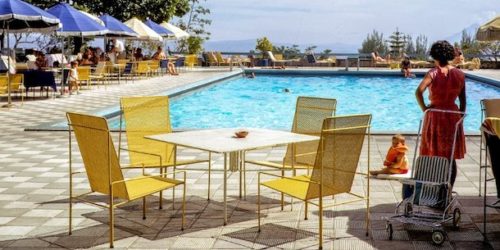
Northland’s pool, snack bar, hamburgers and fries served on the patio — along with family Fourth of July parties with sack races, hot dogs, and fireworks — was heaven enough for me. But my parents wanted me to enjoy all the benefits of Northland membership, which included golf and tennis lessons for kids. I had learned to hate tennis at camp, but golf brought me to new levels of wishing I never had to do anything besides sit on the sofa and read. Mini-golf was fun; colored balls, little windmills, a chance to hit your sister with the putter. Golf lessons were ten weeks spent just on my stance, swinging the club at an imaginary ball, then having my body manipulated by a creepy assistant golf pro so I could swing at nothing again. When I was finally given a real golf ball, I managed to sideswipe it, knocking the ball off the tee onto the grass. I was ordered back to stance school, at which point I put my club and feet down and refused to go to golf lessons ever again.
***
In fifth grade I was one of the white mice in another of Duluth’s experiments in education. As a result of all that testing the year before, it was determined that five Congdon fifth graders — me and four boys — deserved “enrichment education.” We would spend our mornings in a special class at Endion Elementary and afternoons at Congdon. I have no idea how my Congdon teacher, the huge Miss Johnson, felt about this. During all my previous elementary school years, there was never any schedule for the day. After we said the Pledge of Allegiance, we might have math or social studies or reading, whatever the teacher felt like teaching. We would go weeks without taking out our music books and then sing for an hour every day for three weeks. But because the five of us would receive “enriched” instruction in English and social studies, Miss Johnson was forced to structure her day to cover those subjects in the morning. In the afternoons, when we were back at Congdon, Miss Johnson would teach math, a smidgen of science (none of those spinster teachers cared about science at all), art, music, and whatever else needed to be taught.
Since there were five of us, the five mothers each took a day of the week to pick all of us up (two kids in the front, three in the back, and please please please don’t let me be squeezed between two boys) in the morning, then shuttle us back to Congdon in time for lunch. It was kind of a requirement for our enriched education, as no other form of transport was offered. My mother bitched — as probably the other four mothers did — every time her day to drive came around.
I loved the Endion Elementary enrichment classes, and I adored our teacher. Miss Steinbeck, a classicist, took us through ancient history, from Egypt to Rome. We wrote stories set in those eras, acted out Greek myths, built a tiny Acropolis, studied sculpture and urns and pyramids. It was a geek’s paradise.

It was also the perfect way to make a socially awkward girl like me even more so. Just being out of my regular Congdon class half the day made me an oddball. When I had nothing more exciting to report to my classmates about the mysterious doings of our morning enrichment class than “We looked at hieroglyphics,” I went back to being ignored and then even further alienated from fifth grade girls’ society.
The educational powers that be weren’t done yet. Several students were also pulled out of Miss Johnson’s room one afternoon a week for a special creative writing class, including Nancy Erman, the one friend I had left. I was consumed with jealousy, as it was universally accepted that I was the best writer in fifth grade. Being told that the only reason I didn’t get to go to creative writing was because I was already pulled out of class half the day did not make me feel any better, and I am afraid I was a snotty little bitch to Nancy for quite a while.
Because I was not enough of a weirdo, there came the afternoon when Miss Johnson escorted the girls out of the classroom and down to the gym. Everyone, she announced, “except Gay. Your mother didn’t sign the permission slip.” Every eye, boy and girl, turned towards me as I tried to will myself invisible. Two hours later, the girls returned, giggling and pinching each other. I was too humiliated to ask what I had missed.
I finally got Nancy to tell me. It was a movie about menstruation, sponsored by Modess sanitary pads, starring a caterpillar who turns into a butterfly. Obviously all the other girls would now metamorphose into butterflies while I would remain a lowly caterpillar. I held back my tears till I got home, where my hysterics were poo-pooed by my mother, the cause of my shame. She had received the letter from the school about the movie, decided I was too young to learn about these things (I had kept the info shared by the Applebaum cousins to myself), and tossed the permission slip into the garbage. “I didn’t know you’d be the only one,” she shrugged.
My sex education was complete enough to be equally thrilled and embarrassed when my mother announced that she was pregnant. To me, my mother always seemed much younger than other moms; Nancy Erman had a brother and sister who were in college and her grey-haired mother seemed as old as my grandmothers. The year before my parents had been photographed for the Duluth Tribune learning to do that new dance craze, the Twist. The world had not yet been turned over to teen-agers; thirty-year-olds could still be cool.
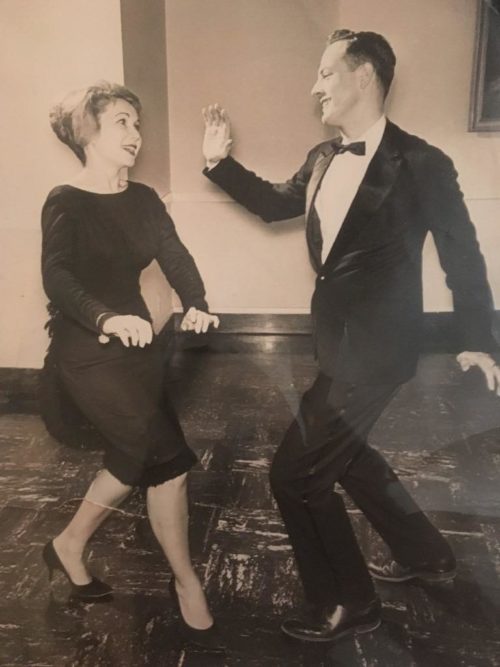
Around the time my mother’s pregnancy began to show, other women started asking with suspicious frequency how old she was. Mom, who had always been paranoid about revealing her age, thought they were hinting about getting pregnant at her advanced age, and refused to answer. I heard her constantly griping, “Old biddies, why do they want to know how old I am?” Someone clued her in to the fact she was being vetted for the Junior League, a club that believed itself to be the pinnacle of high society among Duluth women. My mom had been nominated for Junior League but there was a hitch: you had to be under 35 to join the Junior League. But no one came out and said that why she was asking about my mom’s age, I guess in case my mom got blackballed, so she wouldn’t have hurt feelings.
Duluthians of that time loved joining things: churches (everyone belong to some church, Catholic, Lutheran, Congregationalist, even the mysterious Jewish temple), country clubs, Elks, Moose, Rotary, Lion’s Club, the weird Knights of Columbus and the even odder Masons. My mother was a member of the Women’s Dental Auxiliary and drove around the county distributing toothbrushes and toothpaste to rural schools. My Carlton grandmother was a member of the hoity-toity Kitchi Gammi club, where I was once invited to lunch with her in its cavernous, echoing dining room.
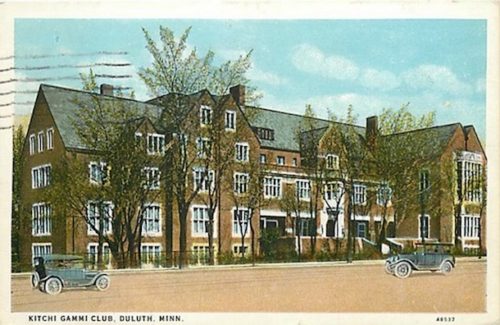
I must have done something wrong — pushed my soup spoon the wrong way or stained the snowy table cloth — as the invitation was not repeated. Grandma Marie was also a member of the Women’s Club, the mother organization to the Junior League, a bunch of do-gooders who were best known for the Duluth Women’s Club Parade of Homes, a chance to poke around in other people’s over-decorated houses for charity.
Why my grandmother Marie couldn’t have just shepherded my mom into Junior League is a mystery. Maybe she was too much of a snob and thought a house painter’s daughter from Aberdeen, South Dakota, even if she was her daughter-in-law, wasn’t good enough to raise money for the Duluth Symphony or the Leif Erickson Park rose gardens.
Alas, my mother never became a Junior Leaguer. Even in an organization composed entirely of women, the husbands had to be considered. My father missed the mandatory Saturday breakfast meeting where my mother was to be interviewed for inclusion in the club; he was too hung over. The Junior League gave him a second chance, he missed that one too.
North Country Girl: Chapter 7 — We Have Ice Cream in the Fridge
For more about Gay Haubner’s life in the North Country, read the other chapters in her serialized memoir. The Post will publish a new segment each week.
TV, board games and toys, and school were indoor activities. But year-round, with the exception of raging blizzards, my mother ordered me to put down my book and go “play outside.” We had enough kids on Lakeview and Vermillion for a good game of Spud (very few cars went down our single-block-long street) or freeze tag. I had a particular fondness for “Mother May I;” little prig that I was, I delighted in sending kids back who forgot to ask permission. “Red Light, Green Light” was too prone to cheating, and always ended up as “I saw you move!” (a lie) countered by “I didn’t move!” (another lie). Once a summer, the ice cream truck magically found its way to our block to interrupt our street games, and I would lose my mind with desire for a Nutty Buddy only to by informed by my mother that if I wanted ice cream we had some in the fridge.
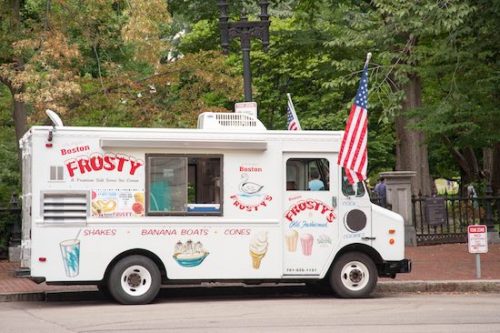
My mom was stingy with treats, doling them out occasionally and always one at a time. Each year we went to the Norshor theater to see the annual Disney feature, missing only “Bon Voyage” as it was condemned by the Catholic church for having a scene where the harried American dad is accosted by a Parisian hooker. Going to the movies was treat enough. Getting popcorn or Junior Mints from the snack bar would be gilding the lily.
It was the same at the Northland Country Club pool. Once in a great while I would be allowed to buy a frozen Snickers or Milky Way at the snack bar, at the exorbitant price of fifteen cents, five cents more than the going rate. Mostly we arrived at the pool after lunch and were forced to exist on grapes from home. But once or twice a summer my mom, my sister Lani, and I would sit up on Northland’s gracious veranda, looking out over the pool and first tee, and order divine hamburgers and golden French fries with brown crispy ends. I would slather everything on my plate with ketchup; Lani would leave most of her food for my mom and I to finish up. I later found out that my mom was afraid my dad would be mad about her minor country club charges; he was too busy losing hundreds of dollars in the never-ending Northland poker game to even notice our once a month lunches on the bill.
We were allowed hot chocolate when skiing at tiny Mount du Lac, but that bordered on a life saving measure when we came out of the zero degree cold with soggy wool mittens and frozen-over ski boot laces. The Mount du Lac “chalet” was a squat square concrete building, with window seats overlooking the three ski slopes (beginner, with the jerky tow rope that yanked me forward, landing face in the snow; intermediate, with the impossible to balance T-bar that dumped me on my back; and advanced, where I never managed to set ski on). The chalet had a jukebox and a pinball table, both of which I was dying to play (probably to postpone my return outside). Putting a dime in either of these machines was regarded by my mom as the height of wastefulness. When I finally got to play pinball, with my own dime, I was astonished at how quickly and surely the silver balls tumbled to the bottom and down the hole, failing to set off even a single bell of pinball success.
Why anyone would put money in a jukebox baffled my mother. “You can hear the same songs for free on the radio!” Pinball was even worse in her eyes: not only did you throw away a dime that could have bought an ice cream cone, candy bar, or bottle of pop, your brain cells curled up and died when you played such a stupid game.
Since all my mother’s efforts to transform me into the outgoing, cute, popular girl that she had been had failed, my mother turned her attention to protecting and improving my one asset, my smarts. She regarded comic books (except for the tedious Classics Illustrated) and Mad magazine as insidious destroyers of children’s intelligence: “If you read comics it will make you so stupid you won’t be able to read anything else.” I couldn’t get enough of that forbidden fruit. A neighbor girl stopped asking me over to play because I could not be budged from her older brother’s breathtaking collection of Mad magazines.
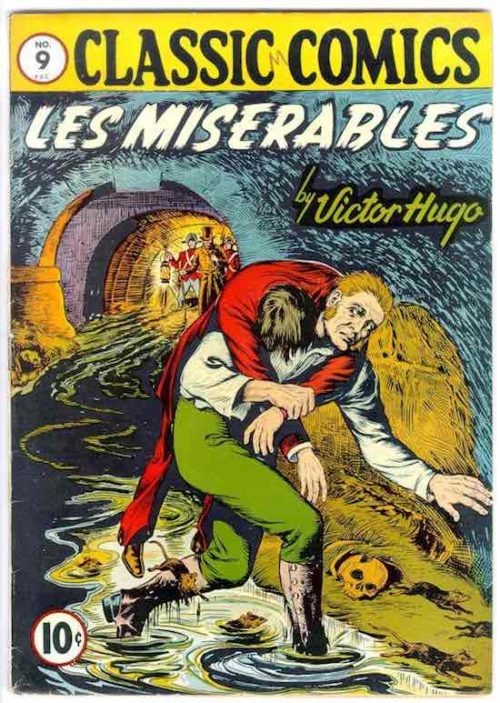
My preferred reading was definitely lowbrow, but I would read anything. When I ran out of library books, I resorted to our World Book Encyclopedia, or the lavishly and gorily illustrated children’s bible (heavy on the Old Testament) that somehow washed up on our living room bookshelf. There were also a few ancient children’s books that I read over and over: The Story of Live Dolls, The King of the Golden River, The Five Little Peppers, and Alice’s adventures both in Wonderland and through the Looking Glass. Eventually my mother realized that I was not to be bullied off of the couch and into the clique of popular Congdon Elementary girls. If I was going to have my nose in a book every waking hour, it should be a book that would improve my mind.
One glorious day I came home from school and found a brown box from the Classics Book Club addressed to me. Getting anything in the mail with your name on it was thrilling. I had long pleaded for my own subscription to Highlights for Children just for that reason, but that was not going to happen while my father could bring home the torn, scribbled-on old Highlights from his office. Inside this book-shaped box was a book, Shakespeare’s Comedies, the plays printed in mouse type on tissue thin paper nicely bound in gilded imitation leather. I started right in on The Tempest, reading the Miranda part out loud and understanding maybe a tenth of what was going on.
The next month brought the Tragedies. I had figured out how to skip the boring parts of the plays, which were everything except the lead female role: I dragged my finger down the page until I found lines for Juliet and Cleopatra and Ophelia, which I declaimed aloud from my sofa stage. The following month the Histories arrived which I barely cracked. Henry, Henry, Henry. Where were the good female roles?
Then came the dunning letters. Which were also addressed to me. My mother had thoughtfully put the subscription to the Classic Book Club in my name, but she had never bothered to pay for it. According to them, I owed $36.00 and my membership would be revoked and I would never receive the next book in the series — Plato’s Republic— unless they received payment in ten days. Where was I going to get the astounding sum of $36? I went to my mother in tears. She looked at the letter, crumpled it up, and tossed it in the garbage. Even more than she hated wasting money, my mother loved getting something for nothing; we had the books already, so why pay for them? But the letters kept coming, informing Miss Gay Haubner that the Classics Book Club was about to take legal action to recoup their money. For months, I expected someone to show up at the door and arrest me.